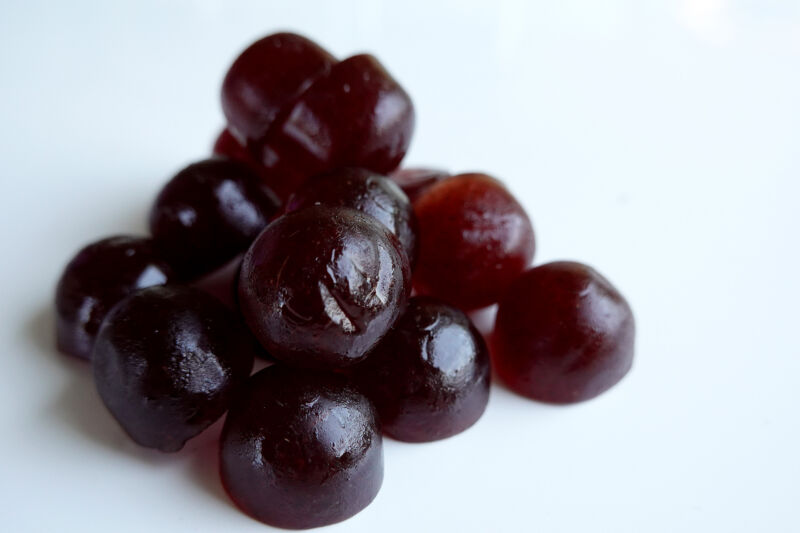
Federal regulators have long decried drug-containing products that appeal to kids—like nicotine-containing e-cigarette products with fruity and dessert-themed flavors or edible cannabis products sold to look exactly like name-brand candies.
But a less-expected candy-like product is sending thousands of kids to emergency departments in the US in recent years: melatonin, particularly in gummy form. According to a new report from researchers at the Centers for Disease Control and Prevention, use of the over-the-counter sleep-aid supplement has skyrocketed in recent years—and so have calls to poison control centers and visits to emergency departments.
Melatonin, a neurohormone that regulates the sleep-wake cycle, has become very popular for self-managing conditions like sleep disorders and jet lag—even in children. Use of melatonin in adults rose from 0.4 percent in 1999–2000 to 2.1 percent in 2017–2018. But the more people have these tempting, often candy-like supplements in their homes, the more risk that children will get ahold of them unsupervised. Indeed, the rise in use led to a 530 percent increase in poison control center calls and 420 percent increase in emergency department visits for accidental melatonin ingestion in infants and kids between 2009 and 2020.
And the problem is ongoing. In the new study, researchers estimate that between 2019 and 2022, nearly 11,000 kids went to the emergency department after accidentally gulping down melatonin supplements. Nearly all the cases involved a solid form of melatonin, with about 47 percent identified specifically as gummies and 49 percent listed as an unspecified sold form, likely to include gummies. These melatonin-based emergency visits made up 7 percent of all emergency visits by infants and kids who ingested medications unsupervised.
The candy-like appeal of melatonin products seems evident in the ages of kids rushed to emergency departments. Most emergency department visits for unsupervised medicine exposures are in infants and toddlers ages 1 to 2, but for melatonin-related visits, half were ages 3 to 5. The researchers noted that among the emergency visits with documentation, about three-quarters of the melatonin products involved came out of bottles, suggesting that the young kids managed to open the bottles themselves or that the bottles weren’t properly closed. Manufacturers are not required to use child-resistant packaging on melatonin supplements.
Luckily, most of the cases had only mild to no effects. Still, about 6.5 percent of the cases—a little over 700 children—were hospitalized from their melatonin binge. A 2022 study led by researchers in Michigan found that, of poison control center calls for children consuming melatonin, the reported symptoms involved gastrointestinal, cardiovascular, or central nervous systems. For children who are given supervised doses of melatonin to improve sleep, known side effects include drowsiness, increased bedwetting or urination in the evening, headache, dizziness, and agitation.
According to the National Center for Complementary and Integrative Health—part of the National Institutes of Health—supervised use of melatonin in children appears to be safe for short-term use. But there’s simply not much data on use in children, and the long-term effects of regular use or acute exposures are unknown. The NCCIH cautions: “Because melatonin is a hormone, it’s possible that melatonin supplements could affect hormonal development, including puberty, menstrual cycles, and overproduction of the hormone prolactin, but we don’t know for sure.”
For now, the authors of the new study say the data “highlights the continued need to educate parents and other caregivers about the importance of keeping all medications and supplements (including gummies) out of children’s reach and sight.”




















+ There are no comments
Add yours